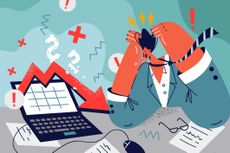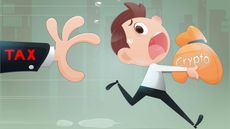Is the Economy Inching Toward a Recession?: The Kiplinger Letter
The odds of the U.S. economy tipping into a recession could depend on how a few key issues are resolved in the coming months.

We may not be in a recession, but the economy still faces several threats in the coming months, which together figure to act as a drag on growth. How much of a slowdown we get depends largely on how these looming issues play out. To help you understand what is going on with the U.S. economy and what we expect to happen in the future, our highly experienced Kiplinger Letter team will keep you abreast of the latest developments and forecasts (Get a free issue of The Kiplinger Letter or subscribe). You'll get all the latest news first by subscribing, but we will publish many (but not all) of the forecasts a few days afterward online. Here’s the latest…
First up — the autoworkers strike at the Detroit Big Three: General Motors, Ford and Stellantis. The UAW has struck three production
plants (one from each company) and 38 parts distribution centers for GM and Stellantis so far, and the two sides remain divided on a new wage deal, with the carmakers’ latest offer not enough for the United Auto Workers’ leader. But we know that consumers will suffer when factories go dark. Vehicle inventories were just recovering this year after COVID-era shortages.
The strike at all three firms will seriously crimp auto supplies if it continues. If that happens, look for new car prices to shoot up by 5% or so, and used-car prices to rise even faster, by about 10%. Owners may not be able to service their vehicles at dealers once parts shortages occur.

Sign up for Kiplinger’s Free E-Newsletters
Profit and prosper with the best of expert advice on investing, taxes, retirement, personal finance and more - straight to your e-mail.
Profit and prosper with the best of expert advice - straight to your e-mail.
In the event that a strike lasts for 40 days — as happened at GM in 2019 when workers went out — GDP growth would suffer a bit, about 0.3%. A longer strike may actually cause a recession. If the two sides do reach a last-minute deal it’ll take some hefty pay increases for workers. The economy would dodge a bullet, but already-high car prices would rise even more.
Then, there’s the threat of a government shutdown starting October 1. Congress is nowhere near passing spending bills to fund federal agencies in the new fiscal year. Some House Republicans want sizable spending cuts and say they’ll force a shutdown if they don’t get them. Senate Democrats are saying “No way.” How this gets resolved isn’t clear as of now. Lawmakers might kick the can and OK a temporary funding bill. But that might merely defer an eventual shutdown and a resulting hit to GDP growth.
Following a possible shutdown is the resumption of student loan repayments, which is slated for October. Not every borrower is likely to start repaying, given the order the White House issued that nonpayment can’t be reported to credit rating bureaus. And some borrowers will use income-based plans that limit how much they must pay each month.
Still, the net result will be more people devoting some of their income to debt service after a long hiatus, which means less discretionary spending money. The most serious risk to growth is also a pretty good bet to come to pass: A pullback in consumer spending. Folks are using up pandemic-era savings that built up when the economy was partially shut down and there were fewer things to spend money on, such as travel and dining. Consumers aren’t tapped out just yet. But the average savings rate is down to 3.5%, from a pre-COVID range of 7%-9%.
Low-income borrowers are falling behind on debt payments. Higher-income households are likely to tighten up as their own savings dwindle. Retailers will have to cope with weaker demand.
All this points to a slower economy as 2024 gets underway.
Related Content
- Will the U.S. Dodge a Recession?: Kiplinger Economic Forecasts
- Kiplinger's Retail Outlook: Consumer Spending Likely to Ease
- All of Kiplinger's Economic Forecasts

David is both staff economist and reporter for The Kiplinger Letter, overseeing Kiplinger forecasts for the U.S. and world economies. Previously, he was senior principal economist in the Center for Forecasting and Modeling at IHS/GlobalInsight, and an economist in the Chief Economist's Office of the U.S. Department of Commerce. David has co-written weekly reports on economic conditions since 1992, and has forecasted GDP and its components since 1995, beating the Blue Chip Indicators forecasts two-thirds of the time. David is a Certified Business Economist as recognized by the National Association for Business Economics. He has two master's degrees and is ABD in economics from the University of North Carolina at Chapel Hill.
-
-
 The Fed Takes Aim At 'Swipe Fees'
The Fed Takes Aim At 'Swipe Fees'If approved, 'swipe fees' on debit card transaction would fall by over 25% under the plan.
By Joey Solitro Published
-
 Three Tips for When Your Small Business Needs to Raise Funds
Three Tips for When Your Small Business Needs to Raise FundsBefore you settle on where to obtain your funding, here are a few tips to keep in mind.
By Angela Ruth Published
-
 Passport Processing Times Speed Up: The Kiplinger Letter
Passport Processing Times Speed Up: The Kiplinger LetterThe Kiplinger Letter The State Department credits an increase in staff and new technology with shrinking processing times.
By Sean Lengell Published
-
 SEC Cracks Down on Misleading Fund Names: The Kiplinger Letter
SEC Cracks Down on Misleading Fund Names: The Kiplinger LetterThe Kiplinger Letter The SEC rules aim to crack down on so-called “greenwashing” — misleading or deceptive claims by funds that use ESG factors.
By Rodrigo Sermeño Published
-
 As Tensions Rise, U.S. Imports From China Shrink: The Kiplinger Letter
As Tensions Rise, U.S. Imports From China Shrink: The Kiplinger LetterThe Kiplinger Letter China now accounts for less than 13.5% of American imports from abroad.
By Rodrigo Sermeño Published
-
 15 Cancer Drugs Are in Short Supply, FDA reports: The Kiplinger Letter
15 Cancer Drugs Are in Short Supply, FDA reports: The Kiplinger LetterThe Kiplinger Letter The U.S. is working to address cancer drug shortages caused by manufacturing and supply chain woes.
By Matthew Housiaux Published
-
 Media Industry Faces Shake-up as Competition Increases: The Letter
Media Industry Faces Shake-up as Competition Increases: The LetterThe Kiplinger Letter Changes in technology, weak advertising and streaming wars that have created disruption and uncertainty.
By John Miley Published
-
 Investments In U.S.-Made Drone Technology Are Gaining Strength — The Kiplinger Letter
Investments In U.S.-Made Drone Technology Are Gaining Strength — The Kiplinger LetterThe Kiplinger Letter The U.S.-Made drone aircraft, software sector has been boosted by a crackdown on Chinese drones amid security concerns.
By John Miley Published
-
 Will the U.S. Dodge a Recession?: Kiplinger Economic Forecasts
Will the U.S. Dodge a Recession?: Kiplinger Economic ForecastsKiplinger Economic Forecasts The labor market is healthy enough to dodge a recession, even though job growth is lethargic.
By David Payne Published
-
 Don't Overlook Tax on Crypto Staking Rewards: Kiplinger Tax Letter
Don't Overlook Tax on Crypto Staking Rewards: Kiplinger Tax LetterTax Letter The IRS has issued guidance on crypto staking rewards, but broker reporting on digital asset sales won't start until 2025.
By Joy Taylor Published









